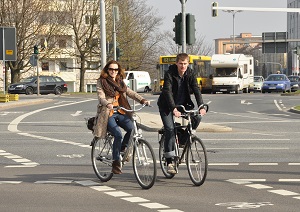Central Meetbike is encouraging the development of sustainable transport policies in Central European countries by supporting the establishment of integrated cycling strategies.
- 16 December 2014
Czech cities are doing very poorly in comparison with other countries; it is rare that bicycle use forms part of the overall transportation system. Cycling Academy should demonstrate how, with a variety of tools, we can achieve a better level of cycling culture.
Cycling is increasingly seen as a solution to traffic congestion and pollution in urban areas, particularly for short journeys and in conjunction with public transport. The Central Meetbike project sought to spread the effective cycling support policies in Germany to the Czech Republic, Poland and Slovakia. The project helped regions assess their local situations and alter policies accordingly.
Changing attitudes
The project achieved this aim by changing attitudes about transport planning and informing politicians and officials about new strategies, particularly those used in Germany to promote cycling. It demonstrated that taking a comprehensive spatial approach, which allows safe movement of all modes of transport, is feasible and cost effective.
The Central Meetbike approach was promoted at its ‘Bike Academy’ training programme to raise awareness among professionals and ensure that people living in a city take part in the action plan. The academy adapted materials used by a programme run by the Deutsches Institut für Urbanistik, with the help of the Technical University Dresden.
National strategies
Moreover, the project assisted town officials in the running of these plans by providing a publication on the “Three Principles” for developing a national cycling strategy. A national strategy was “almost simultaneously” adopted by the governments of the Czech Republic and Slovakia. In Slovakia, a new national cycling coordinator and eight regional coordinators were established. The country’s strategy sets a target of increasing the share of cycling to 10 % by 2020.
The Central MeetBike also highlighted means of supporting cycling in Central European countries. "The experience of many German cities indicated how to improve conditions for cyclists," says Prof Gerd-Axel Ahrens from the Department of Transport and Traffic Planning, Technical University of Dresden, which was a partner of the project. "We also learned that cycling is only one part of a system of sustainable mobility and also an important prerequisite for a better life in central cities," he adds.
Total investment and EU funding
Total investment for the project “Central MeetBike - sustainable transport in Central European Cities through Improved integrated bicycle promotion and international networking” is EUR 2 762 572, of which the EU’s European Regional Development Fund is contributing EUR 2 271 743 from the Operational Programme “CENTRAL EUROPE” for the 2007 to 2013 programming period.

